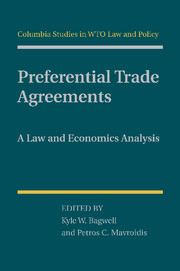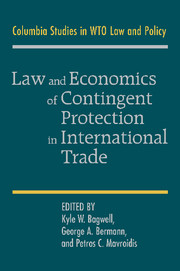17 results
3 - Border Instruments
-
-
- Book:
- Legal and Economic Principles of World Trade Law
- Published online:
- 05 April 2013
- Print publication:
- 22 April 2013, pp 68-204
-
- Chapter
- Export citation
Contents
-
- Book:
- Preferential Trade Agreements
- Published online:
- 03 May 2011
- Print publication:
- 07 March 2011, pp v-vi
-
- Chapter
- Export citation
Index
-
- Book:
- Preferential Trade Agreements
- Published online:
- 03 May 2011
- Print publication:
- 07 March 2011, pp 269-280
-
- Chapter
- Export citation
Frontmatter
-
- Book:
- Preferential Trade Agreements
- Published online:
- 03 May 2011
- Print publication:
- 07 March 2011, pp i-iv
-
- Chapter
- Export citation

Preferential Trade Agreements
- A Law and Economics Analysis
-
- Published online:
- 03 May 2011
- Print publication:
- 07 March 2011
Introduction: The Law and Economics of Contingent Protection
-
-
- Book:
- Preferential Trade Agreements
- Published online:
- 03 May 2011
- Print publication:
- 07 March 2011, pp 1-6
-
- Chapter
- Export citation
Contributors
-
- Book:
- Preferential Trade Agreements
- Published online:
- 03 May 2011
- Print publication:
- 07 March 2011, pp vii-viii
-
- Chapter
- Export citation
Introduction
-
-
- Book:
- Law and Economics of Contingent Protection in International Trade
- Published online:
- 03 May 2010
- Print publication:
- 28 December 2009, pp 1-6
-
- Chapter
- Export citation
4 - The Enduring Problem of World Trade Organization Export Subsidies Rules
-
-
- Book:
- Law and Economics of Contingent Protection in International Trade
- Published online:
- 03 May 2010
- Print publication:
- 28 December 2009, pp 116-171
-
- Chapter
- Export citation

Law and Economics of Contingent Protection in International Trade
-
- Published online:
- 03 May 2010
- Print publication:
- 28 December 2009
Contributors
-
- Book:
- Law and Economics of Contingent Protection in International Trade
- Published online:
- 03 May 2010
- Print publication:
- 28 December 2009, pp vii-viii
-
- Chapter
- Export citation
Frontmatter
-
- Book:
- Law and Economics of Contingent Protection in International Trade
- Published online:
- 03 May 2010
- Print publication:
- 28 December 2009, pp i-iv
-
- Chapter
- Export citation
Contents
-
- Book:
- Law and Economics of Contingent Protection in International Trade
- Published online:
- 03 May 2010
- Print publication:
- 28 December 2009, pp v-vi
-
- Chapter
- Export citation
Index
-
- Book:
- Law and Economics of Contingent Protection in International Trade
- Published online:
- 03 May 2010
- Print publication:
- 28 December 2009, pp 413-424
-
- Chapter
- Export citation
7 - Economic Theory and the Interpretation of GATT/WTO
-
-
- Book:
- New Frontiers in Economics
- Published online:
- 06 July 2010
- Print publication:
- 06 September 2004, pp 205-234
-
- Chapter
- Export citation
It’s A Question of Market Access
-
- Journal:
- American Journal of International Law / Volume 96 / Issue 1 / January 2002
- Published online by Cambridge University Press:
- 27 February 2017, pp. 56-76
- Print publication:
- January 2002
-
- Article
- Export citation
3 - Preferential agreements and the multilateral trading system
-
-
- Book:
- Market Integration, Regionalism and the Global Economy
- Published online:
- 24 February 2010
- Print publication:
- 26 August 1999, pp 53-79
-
- Chapter
- Export citation



